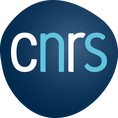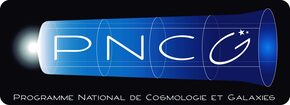Theory of Gravitation and Variation in Cosmology (2nd edition)
Théorie de la gravitation et variations en cosmologie
26 – 30 July 2021
|
Scientific Committee
Comité scientifique Luc Blanchet (Institut d’Astrophysique de Paris) Thomas Buchert (Centre de Recherche Astrophysique de Lyon) Cédric Deffayet (Institut d’Astrophysique de Paris) Ruth Durrer (Université de Genève) Pedro Ferreira (University of Oxford) Nick Kaiser (ENS Paris) Peter Wolf (Observatoire de Paris) |
Organizing Committee
Comité d’organisation Brax Philippe (IPhT-CEA) |
|
This thematic school of CNRS aims to provide an overview of the most motivated current theories and tests of gravitation in different regimes, ranging from the scale of the solar system to that of the large structures of the Universe. The emphasis is on recent developments in connection with major current problems in cosmology, such as the origin of the acceleration of the expansion of the Universe. The topics covered are: gravitational waves, tests of gravity in the solar system, gravitation modified at very large scales and inhomogeneous cosmological models.
Main Topics Gravitational Waves (Observational data, the strong field tests of GR, the perspectives of new Physics) Tests in the solar system (Microscope and the equivalence principle, Ephemerides and new physics) Modified gravity (cosmological tests, fundamental theories like massive gravity) Inhomogeneous cosmology (Observational data, Theories) Audience The school is open to the international, it responds to a request from potential participants, such as CNRS researchers, academics and post-docs involved in this field. PhD students are also encouraged to attend: our future researchers. Prerequisite A doctoral level is required indifferently in Astronomy, Astrophysics, Theoretical Physics and Particle Physics. No preliminary upgrading is planned, but educational recommendations associated with the program will be passed on by speakers and will be posted on the school’s website. |
Cette école thématique du CNRS a pour vocation de donner un panorama des théories actuelles les plus motivées et des tests de la gravitation dans les différents régimes, allant de l’échelle du système solaire à celle des grandes structures de l’Univers. L’accent est mis sur les développements récents en lien avec les grands problèmes actuels en cosmologie, comme par exemple l’origine de l’accélération de l’expansion de l’Univers. Les thèmes abordés sont : les ondes gravitationnelles, les tests de la gravitation dans le système solaire, la gravitation modifiée aux très grandes échelles et les modèles cosmologiques inhomogènes.
Grands Axes Ondes Gravitationnelles (le point observationnel, les tests en champ fort de la RG, les perspectives de nouvelle physique) Tests dans le système solaire (Microscope et le principe d’équivalence, Éphémérides et nouvelle physique) Gravité modifiée (tests cosmologiques, théories fondamentales comme gravité massive) Cosmologie inhomogène (le point observationnel, les théories) Public concerné L’école est ouverte à l’international, elle répond à une demande de la part des participants potentiels, tel que les chercheurs CNRS, universitaires et post-doctorants impliqués dans ce domaine. Sont encouragés à s’inscrire également les doctorants : nos futurs chercheurs. Prérequis Il est requis un niveau doctoral indifféremment en Astronomie, Astrophysique, Physique Théorique et Physique des particules. Il n’est pas prévu de mise à niveau préliminaire, mais des recommandations pédagogiques associées au programme seront transmises par les intervenants et figureront sur le site web de l’école. |
The presentations and video are accessible on the website https://conferences.cirm-math.fr/2651.html
Diego Blas (The Autonomous University of Barcelona) A brief introduction to cosmological perturbation theory
Salvatore Capozziello (University of Naples Federico II) Mathematical and Physical Foundations of Extended Gravity
Mikołaj Korzynski (Center for Theoretical Physics, Polish Academy of Sciences) Redshift drift, position drift and trigonometric parallax in general relativity
Paolo Pani (Sapienza University of Rome) Testing strong gravity
John Peacock (University of Edinburgh) Consistency in probing the cosmological model with large-scale structure
Boud Roukema (Nicolaus Copernicus University) Cosmic inhomogeneity and topology
Joe Silk (Institut d’Astrophysique de Paris) Unveiling the early universe on small scales
Roberto A Sussman (National Autonomous University of Mexico) Inhomogeneous Cosmological Models based on exact solutions of Einstein’s equations
Filippo Vernizzi (Institut de Physique Théorique – CEA, Saclay) The Effective Field Theory of Dark Energy
Invited Talks
Tessa Baker (Queen Mary University of London) Testing Gravity with Gravitational Waves
Ismael Delgado Gaspar (National Autonomous University of Mexico) Exact solutions of Einstein’s equations and Relativistic Zel’dovich Approximation
Christophe Le Poncin-Lafitte(SYRTE, Observatoire de Paris) Testing fundamental physics within Solar System
Ugo Moschella (University of Insubria) Dynamical properties of pure k-essential cosmological models
Pierre Mourier (Albert Einstein Institute Hannover) Spatial averaging and backreaction terms on general foliations in relativistic cosmology
Talks
Marie-Noëlle Celerier (Laboratoire Univers et THéories) A new analytic class of solutions to the Einstein field equations for spacetimes sourced by a stationary rotating cylindrical anisotropic fluid matched to a Lewis-Weyl exterior vacuum
Vesselin Gueorguiev (Institute for Advanced Physical Studies, Sofia) Progress within the Scale Invariant Vacuum (SIV) paradigm
Sk Jahanur Hoque (Institute of Theoretical Physics, Prague) Mass loss law for weak gravitational fields: With or without a positive cosmological constant
Bum-Hoon Lee (Sogang University) Gravity theory with the Gauss-Bonnet term
Pratyush Pranav (Centre de Recherche Astrophysique de Lyon) Topo-geometrical characteristics of CMB temperature fluctuations
Alberto Roper Pol (Astroparticule et Cosmologie Laboratoire) Turbulent production of polarized gravitational radiation from primordial helical magnetic fields
Sourav Roy Chowdhury (Southern Federal University) Gravitational waves in the modified gravity
Zeeshan Yousaf (University of the Punjab) Complexity of a self-gravitating system
Short talks
Angelo E. S. Hartmann (University of Insubria) Gravitation as a pre-geometric process
Alice Garoffolo (Leiden University) Gravitational waves cosmological distances in scalar-tensor theories of gravity
Kirill Bazarov (Moscow institute of physics and technology) Quantum Fields in static de Sitter space
Marius Peper (Nicolaus Copernicus University) How do voids influence galaxy evolution?








